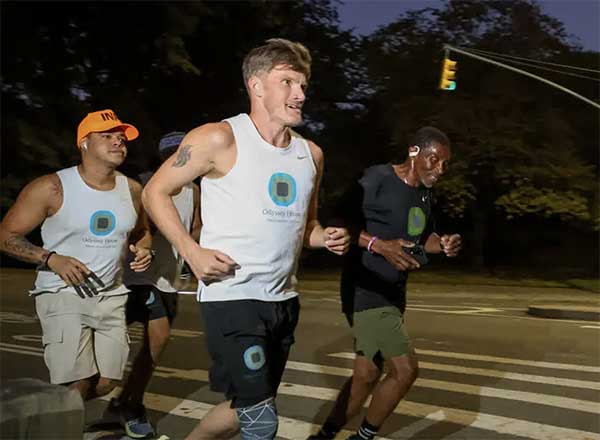By Jennie Coughlin
The New York Times

After months of training as part of his recovery, Travis Friese is running his first marathon. Credit…Mimi d’Autremont for The New York Times
His first time in rehab, Travis Friese thought he could just learn to use drugs less frequently, and in that way avoid the negative effects of addiction.
His second time in rehab, he knew he needed to try a different approach.
And that is how he found himself, in May, running for the first time in some 25 years.
Friese, who was a high school track runner, set off on the lower loop of Central Park, aiming to go just one mile with a mix of running and walking. He finished the 1.7-mile loop, then went around again.
“All it took was that first run for me to remember why I used to love running as a kid,” said Friese, who spoke with traces of a Southern accent.

Travis Friese, who has been training for the New York City Marathon for six months, is a member of Odyssey House, a sober living community. Credit…Mimi d’Autremont for The New York Times
Now, after months of training as part of his recovery, he is running in his first marathon, one of nine members of the Run for Your Life team, which is organized by Odyssey House, a residential addiction treatment program.
“It’s something they can do that’s tangible, that’s physical,” said Andre Matthews, 64, who coaches the team. Matthews was a patient himself at Odyssey House when he helped create the running program with John Tavolacci, the organization’s chief operating officer.
Both say that the program is just a small piece of recovery, what Tavolacci calls the tip of the iceberg. Friese sees it differently. He calls it the foundation.

Mr. Friese trains with a running team at Odyssey House. Credit…Mimi d’Autremont for The New York Times
Since May, he said, every run, every longer distance, every race has shown him that he can set goals and accomplish them.
“That has translated to so much more in my life than just running,” he said. “The confidence that Run for Your Life has helped me build is really driving all the other work that I’m doing in this program, with my recovery.”
That’s how he got to the starting line today. For the first time in decades, Friese said, he had set a goal: to run the New York City Marathon.
He has since set other goals. To move into his own apartment. To become a certified alcohol and substance abuse counselor, so he can help others.
“There’s a way out of sleeping on park benches and doing drugs every day,” Friese said, or of being in a place “where everybody on the train is looking at you sideways and moving away from you.”


